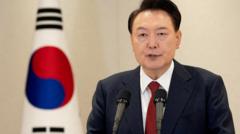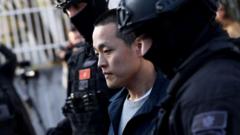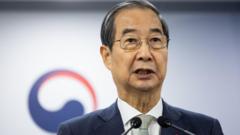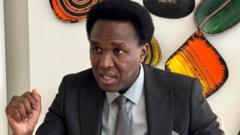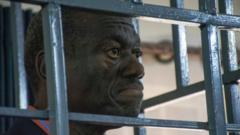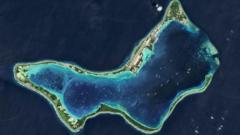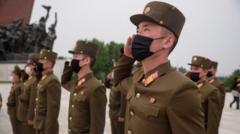South Korea's National Assembly has voted to impeach acting president Han Duck-soo, following a tumultuous session that saw lawmakers from the ruling People Power Party (PPP) protesting the vote. With Han's removal pending confirmation from the Constitutional Court, this marks a significant chapter in South Korea's ongoing political conflict initiated by President Yoon Suk Yeol's controversial martial law attempt.
South Korea's Parliament Votes to Impeach Acting President Han Duck-soo Amid Ongoing Political Turmoil
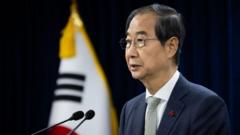
South Korea's Parliament Votes to Impeach Acting President Han Duck-soo Amid Ongoing Political Turmoil
In a historic move, South Korea's parliament impeached acting president Han Duck-soo after a session filled with protests and political strife, heightening the ongoing political instability in the country.
In a historic turn of events, South Korea's National Assembly has officially voted to impeach acting president Han Duck-soo. This decision comes just weeks after parliament moved to impeach President Yoon Suk Yeol amid political chaos triggered by Yoon's controversial declaration of martial law on December 3rd. The motion to impeach Han passed with 192 votes—exceeding the required 151—reflecting a critical moment in South Korea's political landscape.
The parliamentary session on Friday was marked by dramatic scenes as lawmakers belonging to the ruling People Power Party (PPP) vocally protested the vote outcome. Members of the PPP disrupted the proceedings with chants of "invalid!" and "abuse of power!" directed at National Assembly speaker Woo Won-shik after he announced that only a simple majority was needed for Han's impeachment, as opposed to the 200 votes required for Yoon's impeachment. This led many in the ruling party to boycott the vote.
In a statement following the vote, Han indicated he would suspend his duties to avoid exacerbating the crisis, while he awaits a ruling from Korea's Constitutional Court, which is tasked with evaluating the legitimacy of the impeachment. The court has a 180-day timeframe to deliver its verdict, putting Han's immediate future in a precarious position.
The opposition initially filed an impeachment motion against Han after he blocked the appointment of three judges intended to oversee Yoon's impeachment case. The court's decision will play a pivotal role in determining whether Yoon’s pending impeachment stays in force. Given that there are currently only six judges available—out of the standard nine—any single judge dissenting could thwart Yoon's removal.
The backdrop of this political upheaval lies in Yoon's attempt to impose martial law, which he later reversed amid significant parliamentary opposition. Yoon has since faced numerous legal challenges, including accusations of insurrection against several top officials from his government.
The political situation has contributed to economic instability, with the won dropping to a historically low exchange rate against the US dollar, a situation both major parties attribute to the other's failures. Han's impeachment is expected to further complicate the existing political gridlock, raising concerns about the future direction of governance in the country. Finance minister Choi Sang-mok is slated to take over interim duties following Han's removal, but the political climate remains tense as the nation grapples with this unprecedented legislative turmoil.

